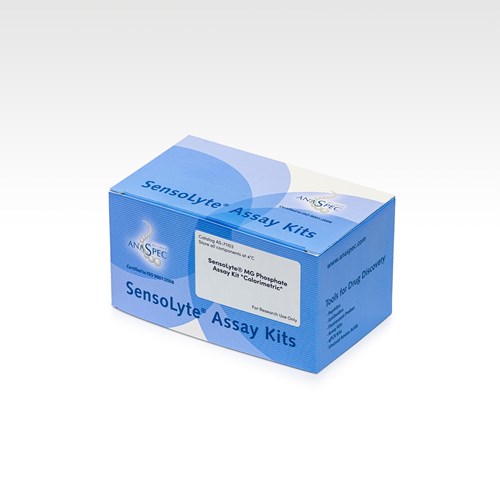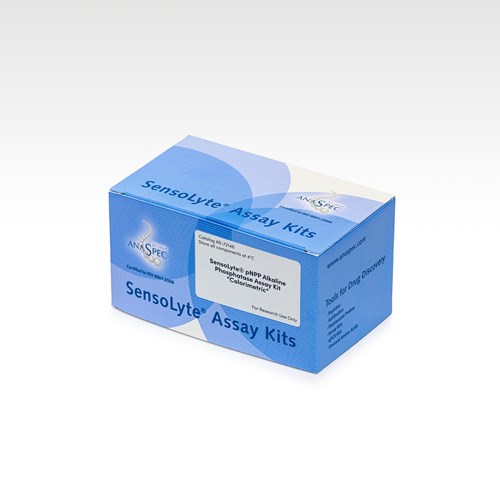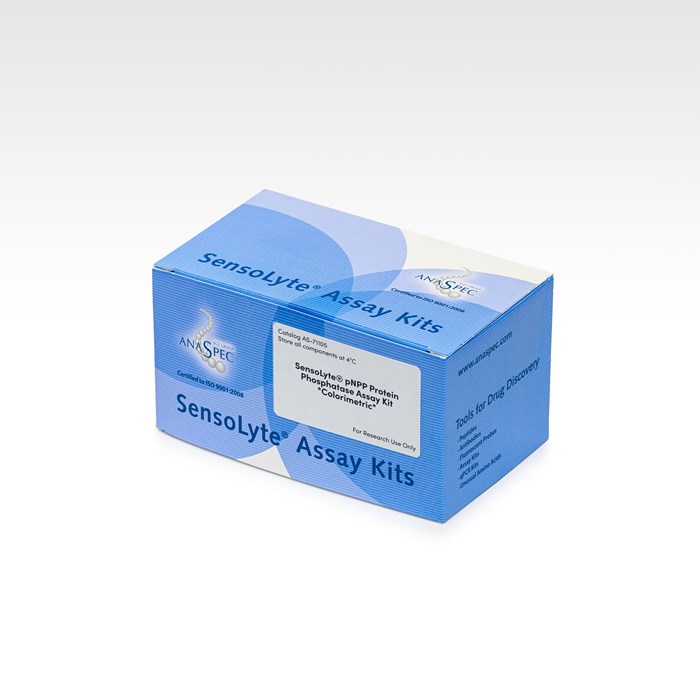SensoLyte® pNPP Protein Phosphatase Assay Kit Colorimetric - 1 kit
- Cat.Number : AS-71105
- Manufacturer Ref. :
-
Availability :
In stock
- Shipping conditions : Ice delivery fees must be applied
Alternative choices
Protein phosphatases have received great attentions as drug-screening targets. p-Nitrophenyl phosphate (pNPP) is proven to be an effective chromogenic substrate for protein tyrosine phosphatases and serine/threonine phosphatases. SensoLyte® pNPP Protein Phosphatase Assay Kit uses pNNP to quantify protein phosphatase activities. The kit can be used for characterizing kinetics of enzyme reaction and high throughput screening of protein phosphatase inhibitors. It has high sensitivity and wide linear range (The detection limit is generally 3 ng or below). The kit contains: - pNNP chromogenic substrate - Protein phosphatase inhibitor - Assay buffer - A 'mix and read' assay protocol that is compatible with HTS liquid handling instruments
Specifications
| Packaging | |
| Kits components |
|
|---|---|
| Properties | |
| Absorbance (nm) |
|
| Storage & stability | |
| Storage Conditions |
|
| Activity | |
| Application | |
| Biomarker Target | |
| Detection Method | |
| Detection Limit |
|
| Research Area | |
| Sub-category Research Area | |
| Usage |
|
| Codes | |
| Code Nacres |
|
Downloads
You may also be interested in the following product(s)


SensoLyte® pNPP Alkaline Phosphatase Assay Kit Colorimetric - 1 kit
Citations
Crystal structure and putative substrate identification for the Entamoeba histolytica low molecular weight tyrosine phosphatase
Mol Biochem Parasitol. . 2014 Feb 15 ; 33 193(1) | DOI : 10.1016/j.molbiopara.2014.01.003
- A.S. Linford
- et al
Liquid fructose downregulates Sirt1 expression and activity and impairs the oxidation of fatty acids in rat and human liver cells
Biochim Biophys Acta . 2014 Jan 13 ; 1841(4) 514 | DOI : 10.1016/j.bbalip.2014.01.002
- A. Rebollo
- et al
Impaired dephosphorylation renders G6PD-knockdown HepG2 cells more susceptible to H(2)O(2)-induced apoptosis.
Free Radic Biol Med . 2010 Apr 24 ; 361 49(3) | DOI : 10.1016/j.freeradbiomed.2010.04.019
- C. Lin
- et al
Heat Stabilization of the Tissue Proteome: A New Technology for Improved Proteomics
J Proteome Res . 2009 Feb 01 ; 8(2) 974 | DOI : 10.1021/pr8006446
- M. Svensson
- et al
Tyrosine phosphatase SHP-1 in oxidative stress and development of allergic airway inflammation.
Am J Respir Cell Mol Biol . 2008 Apr 25 ; 39(4) 412 | DOI : 10.1165/rcmb.2007-0229OC
- Y. Cho
- et al
Poliovirus entry into human brain microvascular cells requires receptor-induced activation of SHP-2.
EMBO J . 2007 Aug 23 ; 26(17) 4016 | DOI : 10.1038/sj.emboj.7601831
- C.B. Coyne
- et al
Liver kinase B1 expression promotes phosphatase activity and abrogation of receptor tyrosine kinase phosphorylation in human cancer cells.
J Biol Chem . 2013 Nov 27 ; 289(3) 1639 | DOI : 10.1074/jbc.M113.500934
- I.S. Okon
- et al
Two ancient bacterial-like PPP family phosphatases from Arabidopsis are highly conserved plant proteins that possess unique properties.
Plant Physiol. . 2011 Oct 05 ; 157(4) 1778 | DOI : 10.1104/pp.111.182493
- R. Uhrig
- et al
